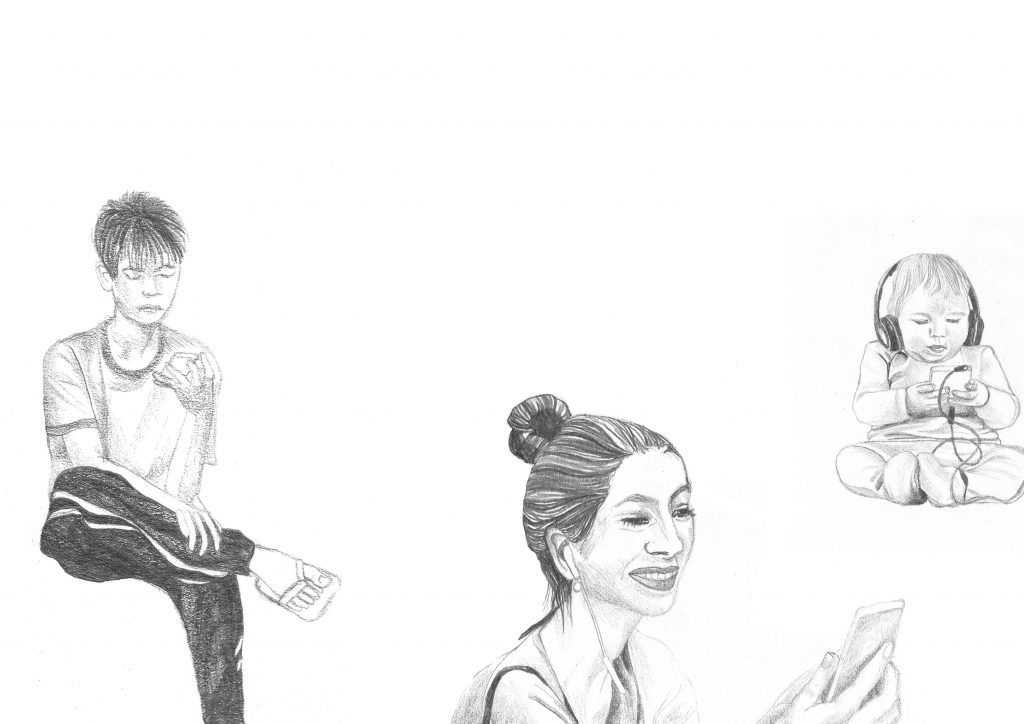 This post discusses some common misconceptions often made in relation to generations and the digital age, around issues such as screen time and ‘digital natives’. The content was developed in response to a 2019 event in London, held as part of the Cognitive Sensations project, which explores the impact of the digital age through art, science and digital culture. [Header image credit: M. Dries, CC BY-NC-ND 2.0]
This post discusses some common misconceptions often made in relation to generations and the digital age, around issues such as screen time and ‘digital natives’. The content was developed in response to a 2019 event in London, held as part of the Cognitive Sensations project, which explores the impact of the digital age through art, science and digital culture. [Header image credit: M. Dries, CC BY-NC-ND 2.0]
Will my child’s preference for texting decrease their ability to hold a conversation? Does a high level of screen time increase the likelihood of depression? How can I parent my child in the digital age, when they know more about technology than me? There is a growing amount of misleading information online about growing up in the digital age, confusing many parents with badly presented research and sweeping comments in relation to why children – so called ‘digital natives’ – spend so much time online and the risks this may pose.
From a generational perspective, individuals born before the 1990s have no real cultural context or history to inform them around parenting in the digital age. Child rights academic Sonia Livingstone estimates that one third of internet users are under the age of 18. A 2018 report by Ofcom reveals that 99% of 12-15 year olds spend 20.5 hours a week online, and 93% of 8-11 year olds spend around 13.5 hours a week. It is no secret that kids spend a lot of time online, but what does this mean for parents, and should they be doing anything about it?
In May 2019, a group of academics and experts in the field of parenting, digital health and education, discussed these pertinent issues at a Cognitive Sensations event in London. Leading the conversation were: Cliff Manning, Head of Digital at ParentZone; Jack Andrews, PhD student in Neuroscience and Mental Health at UCL; and Manolis Mavrikis, Reader in Learning Technologies at UCL Knowledge Lab. As the curator of the programme, in this post I share my findings and perspective from the event and the broader debates surrounding it.
The ‘digital native’ label
First it is important to stress the unhelpful nature of the label ‘digital native’. The term was first popularised by Marc Prensky in his 2001 article ‘Digital Natives, Digital Immigrants’, promoting the perception of a digital skill gap between generations.
In their paper Ellen Helsper and Rebecca Enyon found that generation alone is not a significant variable in defining a digital native: breadth of use, experience, self efficacy, gender, and education are just as important as age in characterising a digital native. As they state:
Our analysis does not support the view that there are unbridgeable differences between those who can be classified as digital natives or digital immigrants based on when they are born… This is important because the term digital native, net generation and other catchy terms are being used widely in public and political debate.
At the event, Cliff Manning reminded us that digital skills are functional, not developmental. It would benefit society to re-think what they mean by digital native. If ‘digital native’ is representative of skill, then it should not be age dependent.

The parent and the adolescent
So if kids aren’t necessarily more skilled at using technology, why the high level of screen time? Jack Andrews discussed the developmental stages of an adolescent and how this might impact digital technology use. Between the ages of 10-25 years, adolescents are particularly influenced by their peers, and care most about spending time with their friends. As this period induces significant structural development in the brain, changes in the prefrontal lobe cause them to feel conscious of what others think, and they are greatly influenced by reward processing.
Smartphones become an instrument in the process to help adolescents achieve what is important to them. Manning reflected that although their greatest social influences tend to be at school, online networks offer access to a vast community of peers, easy control over social activity, and the ability to ‘collect friends’.
Parental control and the regulation of digital activity, may have more weight on a child than one would assume. Both Andrews and Manning agreed strongly that actions such as banning phones or cutting down children’s screen time severely, is a form of social exclusion and should be avoided.
Digital regulation is a subject widely explored by Sonia Livingstone and Ellen Helsper in their paper identifying young people’s psychological vulnerability to online risks. In Helsper’s research, she outlines how different levels of parental mediation around the internet reveal a strong correlation to the digital skills of the parent:
- Low level: parents are less likely to moderate their child’s online activity, as their knowledge of online risks are weak.
- Average level: parents are more likely to moderate their child’s online activity, as a tactic to combat risks.
- Advanced level: parents are less likely to moderate their child’s online activity, as they believe that opportunities online outweigh the potential risks.
Although authoritative parenting is successful in limiting a child’s online risks, does it reduce the vast number of online opportunities? Instead of removing a child from technology altogether, parents should take greater interest in the technologies and platforms introduced, and further action in understanding the roots behind online risks. It is not the device that is the problem, it is the content.
Screen time and mental health
An area of research that is often misrepresented is the relationship between smartphones and mental health. Psychologically, the internet acts as both a safe place and symptom for young people’s vulnerability, with the ability to shape their behaviour.
American psychologist Jean Twenge has christened the youngest generation ‘iGen’, characterised by an entire adolescence spent with smartphones and social media. In Twenge’s analysis of national surveys conducted between 1976-2016, she argues that iGen are: less likely to go out with their parents and friends; feel more excluded and lonely; are more likely to report feelings of depression; and are more likely to commit suicide.
The general consensus in the discussion, criticised Twenge’s use of broad studies which are tweaked to align with her views. This is largely reflected by Sonia Livingstone, who critiques the of use of ‘popular hyperbole’, with self-promotion interests in the market research industry. Although the rise of the digital age has been an extremely influential period in society, there are other wider cultural, economic and policy developments that could impact youth wellbeing. We discussed some of these influences, ranging from; huge pressures on support workers, cuts in funding and less NHS workers available for support; to societal changes in an understanding of mental health, resulting in an increase in diagnosis levels.
Academic research examining negative outcomes of children’s technology use, reveal that the problems go further than the device. In a recent paper, Ellen Helsper and David Smahel give evidence that ‘psychologically, vulnerable children with higher levels of digital engagement have the most negative outcomes’. This supports the argument that smartphones associated with negative reports of mental health and wellbeing should not be the only factor considered. One must take into account a child’s situation, when considering if the device is the problem.
Takeaways for parents
- ‘Screen time’ is not the problem. Parents must consider the opportunities available to children online. The debate is concerned with the quality of time spent online, not the amount.
- Children’s online environments aren’t just games. It is the parent’s responsibility to take interest in the digital content their children enjoy. How can you equip your child with the necessary skills to avoid negative outcomes online?
- ‘Digital natives’ are a myth. Misaligned conceptions around generational digital differences, can only further separate generational views of society. If parents and children were to gain a more nuanced perspective around technology together, they can become confident together in achieving the full potential of technology.
A modifed version of this post originally appeared on the Cognitive Sensations blog and has been reposted here with permission.
This article represents the views of the author, and not the position of the Parenting for a Digital Future blog, nor of the London School of Economics and Political Science.





